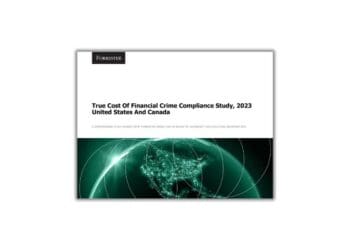During the past two decades, we have witnessed how financial crime compliance (FCC) has evolved from a basic customer identification program as laid down in Bank Secrecy Act 1970 to the current spectrum of regulations. And while technology can help address processes and platforms, one area may be overlooked in many institutions — people.
The regulations FIs must confront are vast and varied, including measures around corporate transparency and beneficial ownership, sanctions screening of customers and transactions, risk-based know-your-customer (KYC) and anti-money laundering (AML), politically exposed persons (PEP) and adverse media screening, anti-bribery and corruption — and so much more.
Financial institutions have been responding to these changing mandates by developing new and incremental technology platforms and processes. FCC rests on the three lines of defense — the operations team, the compliance function and the internal audit function. Across these functions, the three Ps play a crucial role in the success of compliance programs of any enterprise — people, process and platforms.
Many innovative solutions are being implemented to enhance effectiveness and efficiency in FCC, covering both processes and platforms. However, not much is discussed about change management focused on people, who form an equally important pillar, apart from routine compliance training. But the reality is that upgrading people is as important as upgrading platforms and processes in FCC transformation programs, and there are some critical steps to achieving successful workforce alignment with changing compliance demands.
People: The Missing Piece in ‘3 Ps’ of Compliance Change Process
FCC transformations have now become synonymous with automation of processes, optimization and digitization of platforms and associated input data, AI, analytics, cloud and robotics. Siloed and legacy systems are making way for integrated new-gen solutions with intelligent algorithms. This is, in turn, enabling straight-through, exception-based processing, thus reducing human intervention in data-entry and collation activities.
Fincrime compliance, from prevention through detection, investigation, reporting and remediation, has remained a judgement-based decision-making function where human cognition plays a critical role. Yet compliance transformations in most cases fail to recognize the human element in change management, which end up focusing primarily on changes to systems, processes, reports, workflows and data models. Failing to integrate people in such change management exercises can negatively impact the success of the compliance change program overall, due to the following reasons:
- Staff insecurity and reluctance to support: Compliance workers tend to develop an insecurity when new transformations are announced, as they fear loss of jobs to machines. This results in their reluctance to contribute to such transformations.
- Uncertainty about roles post the change: Compliance transformations engender changed ways of working, automating some functions while introducing new analysis tools. When staff are not prepared those changes, they face uncertainties of their own roles in the tea, and whether their skills would be sufficient to cope with the new ways of working. This leads to experienced staff moving to roles in other parts of the organization or even leaving it altogether.
- Lack of required skills to execute tasks in new environment: Machines cannot function on their own in FCC where human cognitive decision making is essential. Transformations create new technology and data ecosystems, which require training and upskilling incumbent workforce. Failure to do so can adversely impact compliance as staff may not be capable of performing their tasks in the new system.
- Inefficient use of new technology solutions: Advanced tools and technology implemented in FCC are meant to improve effectiveness of compliance on one hand, while enhancing staff efficiency on the other. If staff are not aware of the additional value of the new systems and processes or optimum usage of their features, the benefits of investments in the new solutions cannot be unlocked.
5 Steps for Effective Change Management of People in FCC Modernization
Compliance transformations must integrate all the three Ps — people, process and platforms — seamlessly to ensure success of the new program. Here are some steps for organizations to incorporate change management of people and align with new processes and platforms in fincrime compliance:
- Continuous engagement and feedback loop: Compliance professionals must be engaged from the beginning of any transformation program, right from business case creation, understanding requirements and gap areas to be addressed, risks and dependencies to feedback on change solutions identified, regulatory changes addressed and audit remarks resolved.
- Communication of vision and roadmap of change: Compliance change, just like any other organizational change, requires a strong line of communication with the people. Lack of this can lead to confusion, information gaps, apprehension and speculation. Informing staff of the vision for compliance change, high-level plan, roadmap, business benefits expected and what will change in practice for the people can help establish trust with all levels of staff.
- Orientation on blended workforce: Providing orientation to staff on the new ways of working, with a blended workforce of physical (humans) and digital (machines) resources goes a long way in reassuring staff that machines will aid the former in their decision making work, rather than replace them. The business value and intelligent features of such machines must be demonstrated to the staff to showcase the advantages and help dispel fears of redundancy.
- Upgrading people on new systems and processes: Fincrime transformations in today’s world involve disruptive changes in terms of new tools and technology implementation. In many cases, the change is dramatic from mostly manual to highly automated steps leading to human decision making. For compliance staff who need to use such tools, they need to be upskilled on these products, working through data outputs and visualizations for better risk-based decisions, using the intelligent features for higher efficiency and making best use of the smart solutions for optimizing detection effectiveness.
- Opportunity marketplace for emerging skills: As digitization drives automation in compliance, many manual tasks are move from man to machine. This invariably leads to a pool of staff who need to be placed in different roles after the transformation. Creating an opportunity marketplace within an organization ensures personalized opportunities for staff learning and development by cross-skilling and upskilling them on roles that are in demand within the organization.
Fincrime compliance is and will continue to remain at least in the immediate future a human decision-dependent function. Experienced FCC professionals are in high demand, yet in very short supply. So it is extremely important to retain and maintain the most updated, upskilled and upgraded FCC workers, who are the lifeblood of such compliance processes.
Whether it is about understanding optimized AML scenarios generated by an analytics tool, deciding to onboard or offboard a customer based on dynamic risk alerts, navigating dynamic dashboards with cross-filters to assess enterprise risk and compliance levels or dissecting network graphs to discover risky customers during investigations, humans need to work with machines increasingly as part of a blended compliance workforce.
Consequently, building trust and enabling a smooth transition to the new world of compliance requires strategic change management with people at its core. You may have the best systems and processes, but without the most trusted, motivated and upgraded people, your new compliance program can never deliver the expected results.



 Sujata Dasgupta is a multiple international award-winning industry leader and global head of financial crime compliance advisory at Tata Consultancy Services, based in Stockholm. She has over 24 years of experience, having worked extensively in the areas of fraud and financial crime prevention across banking operations, IT services and consulting. She has had a rich global exposure through her work with premier banks in several major financial hubs in seven countries across North America, Europe and Asia. She is an accomplished thought leader, author, columnist and speaker and is regularly interviewed by reputed international journals for her analysis and opinions on contemporary topics in this area. She can be contacted on
Sujata Dasgupta is a multiple international award-winning industry leader and global head of financial crime compliance advisory at Tata Consultancy Services, based in Stockholm. She has over 24 years of experience, having worked extensively in the areas of fraud and financial crime prevention across banking operations, IT services and consulting. She has had a rich global exposure through her work with premier banks in several major financial hubs in seven countries across North America, Europe and Asia. She is an accomplished thought leader, author, columnist and speaker and is regularly interviewed by reputed international journals for her analysis and opinions on contemporary topics in this area. She can be contacted on 






